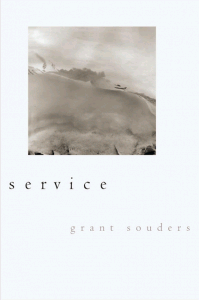Book Review
 “All truths wait in all things,” Whitman advises in Song of Myself. In Grant Souders’s wonder-full new book Service, the world and everything in it stands waiting to be revealed–or perhaps, to do the revealing.
“All truths wait in all things,” Whitman advises in Song of Myself. In Grant Souders’s wonder-full new book Service, the world and everything in it stands waiting to be revealed–or perhaps, to do the revealing.
Almost every title in this collection is a single word describing a thing being contemplated (Yard; Chair; Museum; Airplane) or a description of the speaker doing the contemplating (Painter; Tracker; Auctioneer). The speakers are both animated and reified by the world around them, acting and being acted upon by the world which, in turn, is (re)animated–brought into being–by the perceptions of the speakers.
In “Dweller,” for example, “other things wandered about. / Grass in the wind for example–/ is not easy to describe, so it did so itself.” The wandering “things” here claim an existence and agency independent of the observer. The speaker, like a latter-day Columbus, discovers a new world that has already long existed. The descriptions of the grass are not for the grass; language exists only for the observer. Yet, the grass also has the difficult task of doing the describing. In this sense, the “thing” is the subject doing the action, and the speaker is merely the object, the recipient, the beneficiary.
In this way, Souders’s poetry shares a great deal with haiku poets and other Imagists who attempt to speak of the world by letting the world “speak for itself.” His work recalls Wallace Stevens, whose “Snow Man” “listens in the snow, / And, nothing himself, beholds, / Nothing that is not there and the nothing that is.” One also hears a close kinship to George Oppen, who once wrote “There are things / We live among ‘and to see them / Is to know ourselves’.” For Souders, the world is a mirror reflecting our human perceptions, even the projections of ourselves onto the world, since, as he says in the opening poem, “Naked,” “nature seems and is.”
Much of the difficulty in relating our perceptions of the world has to do with naming, and it has always been this way. Adam and Eve had been nakedly content in paradise—a word whose Persian roots mean a walled garden, suggesting limits and definition–but upon their expulsion, the story goes, they had to bear the awesome burden and god-like responsibility of naming, and defining, the world around them. Souders reminds us we are still engaged in this task.
In “Zenither,” the speaker says “how I wish we / could levitate more than none / unaccompanied / by the naming of seconds, animals, whatever yet.” The uncertainty in the end of this list speaks to the limits of language. Wittgenstein said the limits of our language are the limits of the world, and we all struggle to find the language to put perceptions into words. “Zenither,” a neologism, suggests something higher than the zenith, the highest point above an observer. So far away, and yet comprehensible (however abstractly) through language.
“What” (which is not a question here), reminds us that “What is essential” (emphasis mine). Could this be a sly allusion to Williams, surely another of his literary antecedents: “so much depends upon” what? We must know what; otherwise, how can we know what we know, how to call attention to what we’ve attended—as in the presence of “dry spells where the river is riverless.” Is it still a river? Is the river only the water, or the vessel (the culvert or swale) that sometimes contains the water? The poem continues:
We say We and they, who we called them
are on another peak. So distant . . .
We chase, they continue,
and the hollow leaves
itself.
Here leaves appears to be a noun at first, a subject, but since leaves does not agree with itself in the following line, we go back to see leaves leap into a transitive verb with the subject being “the hollow,” a clever commentary on the protean—and sometimes hollow—nature of language.
The speaker in “Eater” says, “I nouned / my mouth with / almond, automobile, thicket thorn, mudgod. It was those things / I was thinking.” Here the opening verb is “nouned,” again calling attention to the slipperiness of language and the difficulty of naming the things we notice.
“Vocation,” the final poem in the collection, tells of a man who:
holds the name
in mind with the blade in hand to put the name
to the stone. The stone purchased. Purchased
days ago. What he holds now
he cuts and knows nothing of the named.
Can we hold a name in mind the same way we hold a blade or a stone? Language lacks the solidity—the mass and specificity—and our purchase, our hold on language is even less sure than our grasp of the stone. The speaker knows “nothing of the named” not only because of the inadequacy of language, but because of the cut–is it even the same stone?
Translating experience into language is, of course, Souders’s vocation as poet. The poems in Service attest to Souders’s extraordinary powers of observation and his playful and philosophical attempts to locate the world inside the word.
About the Reviewer
John S. O’Connor is a public school teacher and an adjunct professor at Northwestern University. He is the author of two books on writing, Wordplaygrounds and This Time It’s Personal, as well as a chapbook of poetry, Rooting. His poems have appeared in places such as Poetry East, RHINO, and the Cortland Review. His essays have appeared in the Harvard Review, Under and Sun, and Schools, and been named notable in Best American Essays and Best American Sportswriting. O’Connor is also the creator and host of Schooled: the Podcast.